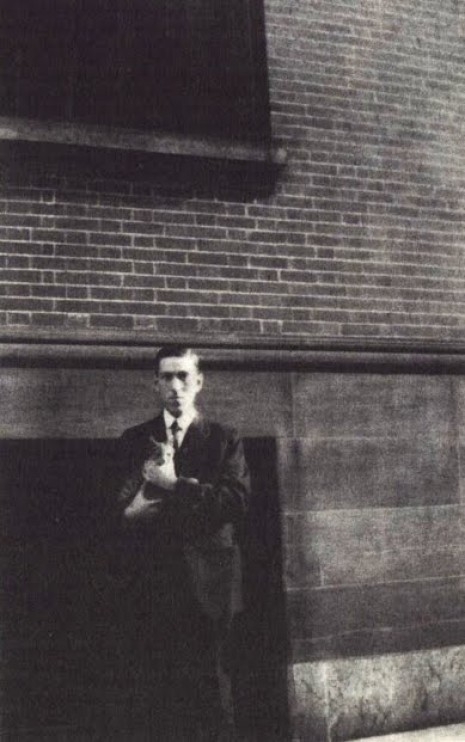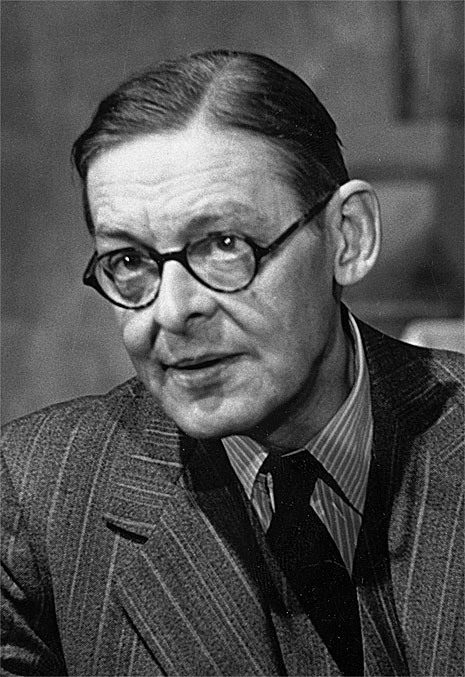
H.P. Lovecraft with Felis, the cat of Frank Belknap Long
It’s fitting that I learned of H.P. Lovecraft’s “Waste Paper” by listening to some interview or other Alan Moore did. Of course, as a parody of “The Waste Land,” Lovecraft’s poem begins with a totally obscure epigraph, unsourced, and in the original Greek: Πἀντα γἐλως καἱ πἀντα κὀνις καἱ πἀντα τὁ μηδἐν. This turns out to be part of the sole surviving verse by Glycon—not the snake god whose priest on Earth is Alan Moore, mind you, but the eponymous poet and inventor of “glyconic meter.” Just as Glycon the god was a hoax, “exposed as a glove-puppet in the second century” (Alan Moore), the Oxford Classical Dictionary says Glycon the poet probably didn’t even write the lonely couplet that comprises his entire literary oeuvre.
And, as John Brannon would say, check it out: the second line Lovecraft left out of this two-line poem, presumably because he didn’t know it existed, elegantly summarized his worldview in seven Greek words: πάντα γὰρ ἐξ ἀλόγων ἐστὶ τὰ γινόμενα. It’s enough to make you agree with what Glycon, or whoever, was saying all along in his single, slender entry in the Greek Anthology, to which one translator added the heading “NIHILISM”:
All is laughter, all is dust, all is nothing,
for all that is cometh from unreason.
Or if you prefer Christopher Isherwood’s translation:
All is but laughter, dust and nothingness
All of unreason born. . . .
HPL omitted the line about “unreason,” according to this Lovecraft scholar, because it didn’t appear in the Greek lexicon that was his source. But “all that is cometh from unreason” would have been the perfect title for the horrified reaction to “The Waste Land” Lovecraft published in his journal, The Conservative, if not the perfect title for his entire collected works:
Do our members realise that the progress of science within the last half-century has introduced conceptions of man, the world, and the universe which make hollow and ridiculous an appreciable proportion of all the great literature of the past? Art, to be great, must be founded on human emotions of much strength; such as come from warm instincts and firm beliefs. Science having so greatly altered our view of the universe and the beliefs attendant upon that view, we are now confronted by an important shifting of values in every branch of art where belief is concerned. The old heroics, pieties, and sentimentalities are dead amongst the sophisticated; and even some of our appreciations of natural beauty are threatened. Just how expansive is this threat, we do not know; and The Conservative hopes fervently that the final devastated area will be comparatively narrow; but in any case startling developments are inevitable.
A glance at the serious magazine discussion of Mr. T. S. Eliot’s disjointed and incoherent “poem” called “The Waste Land”, in the November Dial, should be enough to convince the most unimpressionable of the true state of affairs. We here behold a practically meaningless collection of phrases, learned allusions, quotations, slang, and scraps in general; offered to the public (whether or not as a hoax) as something justified by our modern mind with its recent comprehension of its own chaotic triviality and disorganisation. And we behold that public, or a considerable part of it, receiving this hilarious melange as something vital and typical; as “a poem of profound significance”, to quote its sponsors.
To reduce the situation to its baldest terms, man has suddenly discovered that all his high sentiments, values, and aspirations are mere illusions caused by physiological processes within himself, and of no significance whatsoever in an infinite and purposeless cosmos. He has discovered that most of his acts spring from hidden causes remote from the ones hitherto honoured by tradition, and that his so-called “soul” is merely (as one critic puts it) a rag-bag of unrelated odds and ends. And having made these discoveries, he does not know what to do about it; but compromises on a literature of analysis, chaos, and ironic contrast.
TL;DR: one racist reactionary prefers his own flavor of nihilism to another’s. Sounds like the narcissism of small differences to me! The poem, at least, is funny in parts. There are certain lines (“Meet me tonight in dreamland . . . BAH”) I can’t read without hearing the voice of the late Mark E. Smith.
Read H.P. Lovecraft’s “Waste Paper: A Poem of Profound Insignificance,” after the jump…











